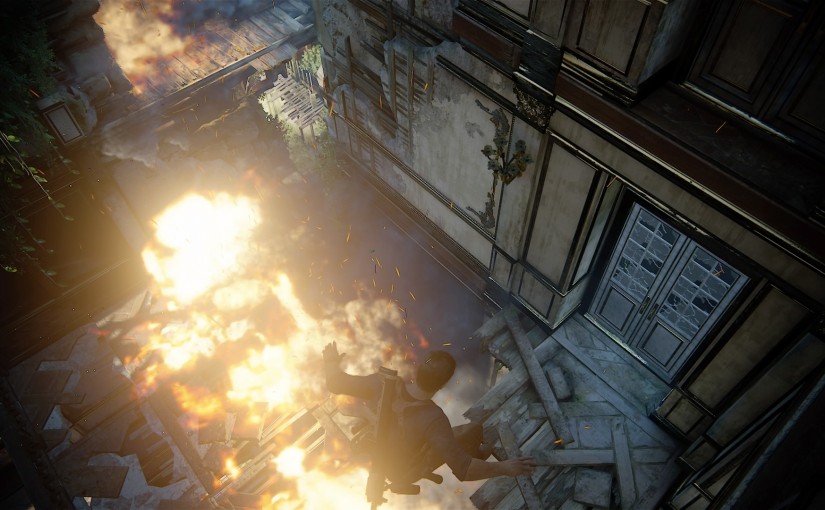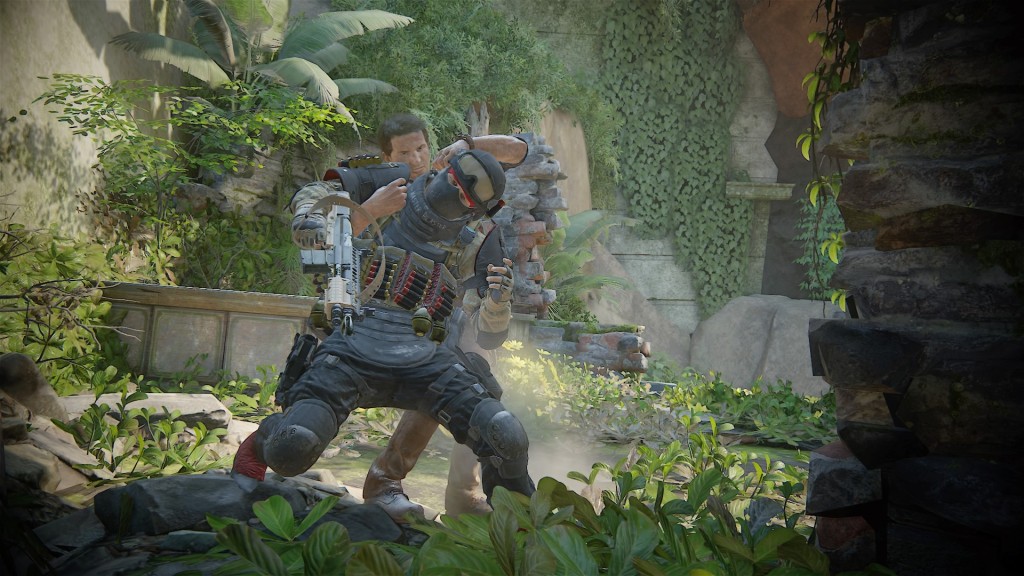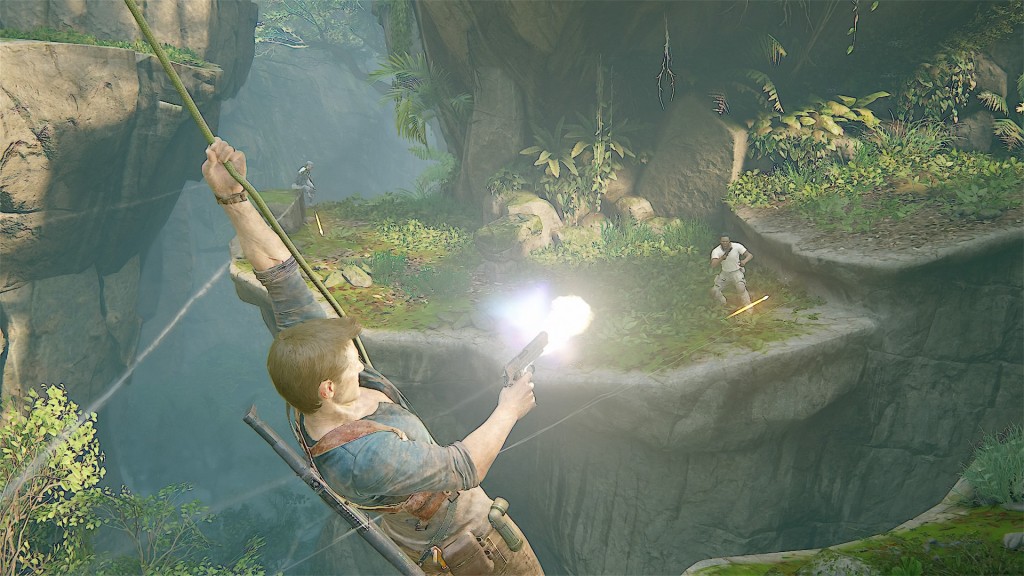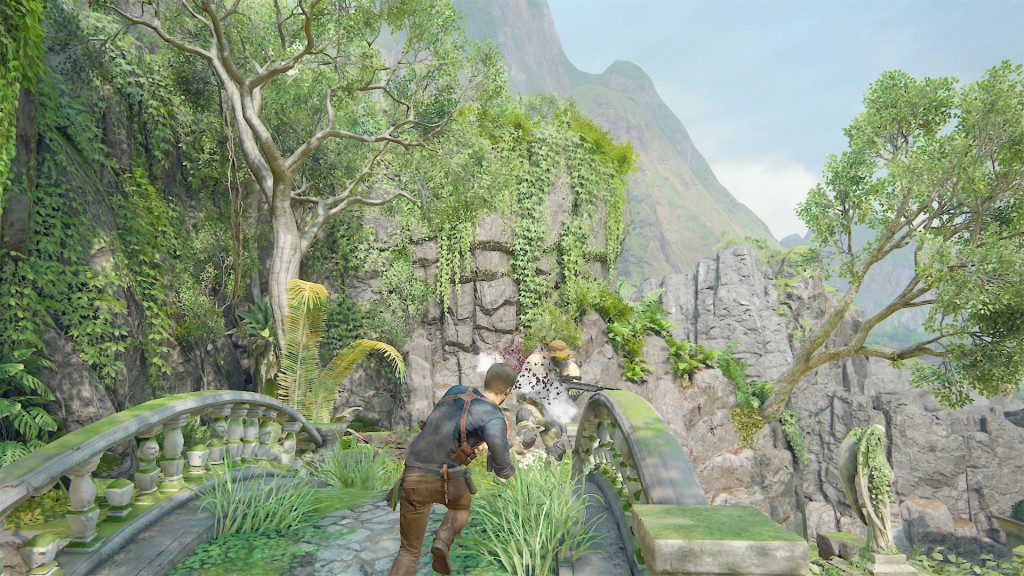written by Ian Hertzberg
Ha! You thought I was done talking about Uncharted 4, didn’t you? Well, like two star-crossed lovers, I cannot stay away. That and I promised to write a second article about Uncharted 4, but that’s beside the point.
If you haven’t read my previous article you can find it here. It discusses both the narrative design and themes in Uncharted 4: A Thief’s End.
I had to write another article because the narrative elements aren’t the only thing about Uncharted 4: A Thief End that are worthy of merit. The gameplay saw some great changes and there were one or two nice set-piece gameplay moments that worked to the game’s benefit.
Gameplay / Mechanics
Uncharted 4 adds a couple of new mechanics or gameplay pieces to spice up the game and give players something new and unique for this entry in the series.
For one, stealth gameplay has been expanded upon. Uncharted 4 stealth gameplay allows you to track enemies and go in-and-out of stealth. Enemies now have a UI elements to indicate their awareness of the player as well. The addition of this works well for the game thematically as Drake as aged and matured a great deal since the beginning of the series and would most likely utilize stealth in order to more safely defeat enemies. At times the stealth felt a little cheap as I could avoid and dispatch enemies with ease negating what could have been a fun and interesting gunfight, but at the same time having that option in how you approach that situation is freeing and creates a more realistic and grounded feel to combat.
Another new gameplay addition is the grappling hook, which adds a great deal of fluidity to combat. I had a blast swing through areas of the game like Tarzan while shooting, tossing grenades, or dropping down, fist first, on enemies. The grappling hook is also used for general traversal and to solve some clever puzzles, but let’s be honest the best part is the drop punch.
Lastly, we have the vehicle gameplay, which was utilized for specific set-piece moments of the game. Finally, Nathan Drake gets to drive! In previous entries any sort of vehicle chase scene would involve someone else behind the wheel while you jump from vehicle to vehicle, fighting bad-guys, but in this entry you finally get to take the wheel yourself and it feels good. Driving through the chase scenes added a new level of tension and freedom allowing me to dart in and out of various alleyways and even ram enemy vehicles. That being said vehicles weren’t just applied to chase scenes. They were also applied to exploration.
Design
The new vehicle gameplay ties in with an element of design that is new to the Uncharted series and that is of openness. While the game may not be open world it has been designed with much more exploration and multiple routes to the player’s object which makes traversing the world feel much more improvised and realistic. This goes into everything from driving your car around a volcano in Madagascar, to haveing many more handholds and foothold when climbing terrain. This give creates a good illusion of being open even though the paths will all eventually diverge into and head to the next part of the story.
The other major change of design philosophy when it comes to Uncharted 4 is its pacing. Previous entries would feature a great deal of combat combined with high-action set pieces and then a smaller portion of platforming and puzzle solving. Uncharted 4 is set with a reverse pacing where action is built up to instead of just a constant. This entry focuses more on narrative pieces, exploration, puzzles, and platforming. There has been a significant decrease in the amount of combat encounters and it serves the game well giving it a pacing more akin to films such as Indiana Jones which served as an inspiration for the Uncharted series.
The new pacing works well as it focuses and highlights the area of the game that shine such as the narrative elements and platforming. It also allowed for more precise and tightly built combat encounters that make great use of the environment.
Lastly, I wanted to just point out one little moment I thought was cool in terms of design. At one point Drake is trying to climb a cliff face in the rain while injured from a recent wreck. So while I was trying to climb this cliff face I would try to jump from one handhold to another as I’m used to doing, but I couldn’t I would stumble and nearly die as a result. The game instead forced me to slow down and carefully grab nearby handholds without jumping which I previously didn’t even know was a feature. I thought it was an interesting piece for that moment as the gameplay mimicked the character having lesser mobility in that situation.
Conclusion
Uncharted 4: A Thief’s End adds a new and exciting gameplay elements that help the game a meld really well with the overall design philosophy of the game. The new pacing really helps create a cinematic feel to the game and highlights the elements of the game that really shine. The new openness adds to the immersion and fluidity of the game creating a more natural feel in how you do everything from transversing environments to fighting enemies. Due to these improvements Uncharted 4: A Thief’s End is a great game and in my opinion the best in the series. Naughty Dog was right to make this the final chapter of Nathan Drake’s saga as it is the best one yet.
As always feel free to comment in the section below. I’m always interested in seeing feedback from readers and hearing new opinions.




